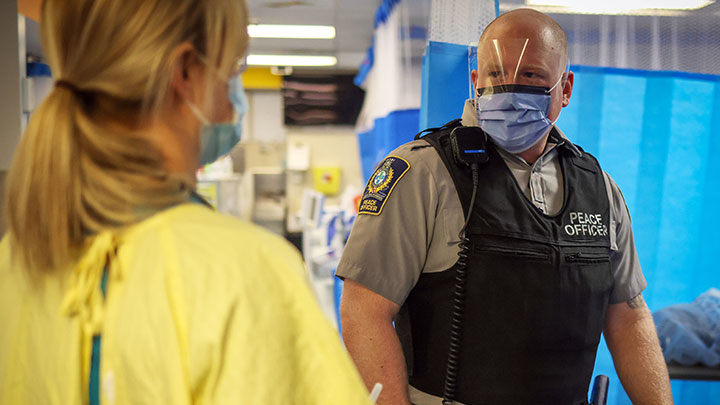
March 4, 2021

Peace officer Ryan Halford, right, talks with a nurse about a patient in Emergency at Peter Lougheed Hospital. Photo by Leah Hennel.
Story by Alison Eresman
CALGARY — In the early days of the COVID-19 pandemic last year, Ryan Halford and his Protective Services colleagues found themselves in a unique situation. While Albertans were learning new safety protocols and getting used to following new rules, Halford and his team had to figure out how to enforce them.
“We didn’t really know what to expect,” says Halford, a Protective Services team lead at the Peter Lougheed Centre (PLC) in Calgary. “Every day we showed up to work was different, as everyone was learning what life was going to look like in the pandemic. We had such a unique circumstance, because we were going to be enforcing the Public Health Act in a way we weren’t used to.”
AHS Peace Officers are often called upon for support when patients are at a high risk of causing harm to themselves or others, or at high risk of leaving the hospital (referred to as elopement). Elopement, while a familiar problem, suddenly became more dangerous — and more important to contain — in a pandemic environment. Clearly, Protective Services needed to be granted new authorities under the Public Health Act.
“We needed the ability to detain people who were unwilling to comply with isolation orders,” adds Halford.
During each shift at the PLC, Halford is responsible for managing a team of up to 12 staff, including AHS Community Peace Officers, contracted security guards, and Safety Ambassadors, a new Protective Services position created in response to the pandemic.
Safety Ambassadors support the clinical-screening staff at acute care sites. They’re responsible for evaluating staff, patients and visitors for COVID-19 risks before entering the building. “Safety Ambassadors recognize problems at the door and stop them by using tactical communications and verbal de-escalation for anyone who isn’t willing to comply,” says Halford. “They’ve meshed really well into our teams. They provide a first point of contact for Protective Services and it’s enabled us to do our jobs effectively.”
Verbal de-escalation is an important part of Protective Services’ role in the hospital environment. Peace officers are highly trained in non-violent crisis intervention and regularly rely on quick thinking to diffuse stressful situations.
Halford notes that some frontline staff don’t understand what he and his colleagues do – “I’ve been called a professional door opener,” he jokes – but to him that means they’re doing their jobs well and keeping units secure.
Reflecting on the anniversary of the COVID-19 pandemic, Halford says: “It all seems so normal now. It’s hard to remember what the transition looked like, or what it was like before.” “It’s hard to believe it’s been a year,” he adds. “But I try not to think about it in that context. There’s no end date, so I just try to stay focused and do my job well.”